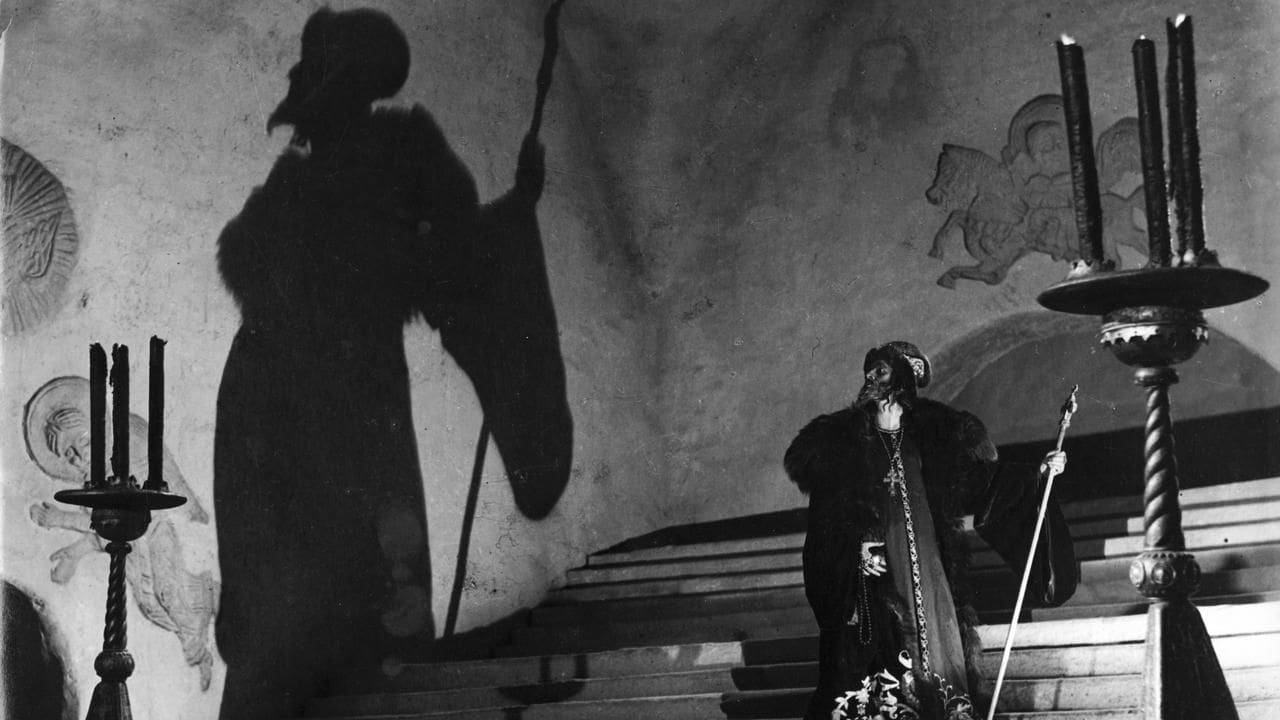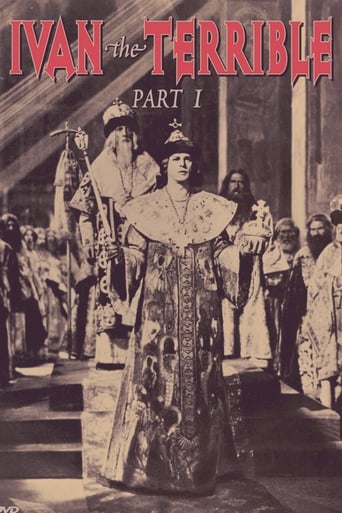

On one hand I see how popularity of this film is warranted. Made by legendary Russian director Sergei Eisenstein for Soviet premier Joseph Stalin, Ivan the Terrible is a biopic of Ivan of Moscow, the first Tsar of Russia. Acting is all good and I certainly think it's a compelling enough view, but my issue is that the film seems very drawn out. It's about an hour and a half but there are maybe five scenes. I'm exaggerating, I know, but it's what it felt like to me. Each scene takes a while and like I said, it feels very drawn out. I don't mean to say that the film is devoid of several very positive aspects. The sets are amazing as is the acting. But in complete fairness I think Eisenstein's Alexander Nevsky (1938) was a better biopic.
... View MoreI read that Russian director Sergei M. Eisenstein had intended to make a three part series, but he only managed to make the first two films, dying of a heart attack before he could complete it. I had to see if it was indeed the masterpiece it is claimed to be, especially as both parts appeared in the 1001 Movies You Must See Before You Die. Basically archduke of Moscow, Ivan IV (Nikolai Cherkasov) crowned himself Tsar of Russia in 1547, and set about reclaiming the territories the country lost. His success in the empire are under threat from his enemies among the Boyars, and the chief amongst them is the Tsar's Aunt, The Boyarina Efrosinia Staritskaya (Serafima Birman), who wants her simpleton son Vladimir Andreyevich (Pavel Kadochnikov) to have a fortune, and there is also warrior Prince Andrei Kurbsky (Mikhail Nazvanov) wanting power and the hand of Tsarina Anastasia Romanovna (Lyudmila Tselikovskaya). Throughout the picture we see the coronation the Tsar, his wedding to Anastasia, his campaigning against the Tartans in Kazar, his illness which everyone believes he will die from, his recovery, his campaigning in the Baltic and Crimea, his exile in Alexandrov which he imposed himself, and his request to return to the Muscovites. Okay, I will be honest, I didn't catch on to all of this myself, it was hard to follow, and not just because I was trying to read the subtitles as well. Also starring Mikhail Zharov as Tsar's Guard Malyuta Skuratov, Andrei Abrikosov as Boyar Fyodor Kolychev, Aleksandr Mgebrov as Novgorod's Archbishop Pimen and Amvrosi Buchma as Czar's Guard Aleksei Basmanov. What I understood of the story was good, the costume design is fantastic, the iconic imagery, such as the shadow the Tsar with that beard, is effective, it works without relying on moving camera-work (i.e. no pans or zooms), and there are certainly some poignant scenes, it may have be hard to read the subtitles due to scratchiness, but it is a historical drama to see. Very good!
... View MoreI know "Ten Best" lists are an exercise in futility since aesthetics are a subjective matter and no one can lay claim to knowing what is best, only what one likes. If the rating system at IMDb had eleven stars, I would award them to this one which, taken together with Part II, would be my all-time favorite film. (As one reviewer already has noted, one cannot truly appreciate what Eisenstein was up to unless one sees both Parts I and II, preferably back to back.) When I was studying film at UCLA, I had to do a term paper in a seminar on film aesthetics and I did it on these two movies. My title was, "Eisenstein's *Ivan the Terrible, Parts I and II: The Perfect Union of Form and Content." I tried to show how Eisenstein created a movie masterpiece by telling a story that works on three different levels: historical, satirical, and autobiographical. The two films (some work was done on a third part, but Eisenstein died of a heart attack before completing it, and in any case, the release of Part II was held up for decades once Stalin had caught on to the film's subtext) only superficially deal with the historical Ivan Grozny (in Russian, the meaning is more "awe-inspiring" or "formidable" than the English "terrible"). In fact, Eisenstein's Ivan is revisionist in the extreme, in part because he wanted to present a heroic figure who unites the Russian people against outside foes (in the movie, the Poles; in Eisenstein's time, Nazi Germany -- in fact, filming in Moscow had to be halted for a time so that production could be relocated to the resort town of Alma Atta). But as Ivan becomes more paranoid following the poisoning of the Czarina, Anastasia, at the hands of the patrician Boyars, he resorts to murderous plotting and counter-plotting, which Eisenstein uses as a metaphor for Stalinist pogroms against anyone "crazy" enough to question his reign. (Remember, if you spoke out against Stalin, you committed suicide by being thrown out of windows by the KGB, and those who escaped this fate wound up in Siberian slavery.) The third level on which the films operate, the autobiographical, presents Eisenstein as Ivan (hinted at by biographer Marie Seton when she included a photo of the director sitting in the Czar's actual chair, his feet dangling just like a shot in the film of the young Ivan during his regency). Eisenstein told Seton he had homosexual tendencies but that he thought homosexuality a "dead end." Of course, in Stalinist Russia, being homosexual was tantamount to being insane -- or traitorous. Eisenstein's movies are full of homosexual imagery, and *Ivan* is no exception. The Oprichniki, for example, Ivan's iron guard of loyal, KGB-like attendants, is depicted as a kind of samurai mafia which at times (e.g. the drunken banquet toward the end of Part II) seems definitely gay. That sequence includes a telling song and dance number by a pretty young Oprichnik who hides behind a female face-mask. In the same sequence, the Czar's drunken nephew, an effeminate young man, is dressed in the royal robes and sent into a cathedral where a Boyar assassin, thinking it is Ivan, stabs him to death. Although the Oprichniks want to kill the assassin, Ivan says to let him go, "for he has killed the Czar's worst enemy." In other words, they've murdered Eisenstein's own perceived weakness: his closeted homosexuality. The movie is full of such insights, and I can't think of a single other film that is so multi-layered. Once you begin looking for these things, you'll want to watch *Ivan* over and over again.
... View MoreWell I will come clean and admit that I was forced as part of my history degree to watch this film, and then write a short film review as part of my grade.Yet even if I had watched the film alone, at my own discretion I found it extremely boring and absurd. The style is dated beyond its years, and the acting is farcical. Rather than use dialogue they instead exchange eye popping glances at each other, or sometimes into thin air. For me, such over the top acting does not convey any greater emotion, and after seeing an extreme close up Ivan's face for the hundredth time I was praying for the film to end.The most disappointing though is how wrong Ivan's character is. This man was nasty, his bodyguard's murderous thugs and his character cowardly. For me the film was nothing but a piece of Stalin propaganda, inaccurate and dull.
... View More